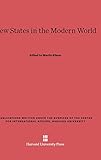New States in the Modern World / ed. by Martin Kilson.
Material type: TextSeries: Publications Written Under the Auspices of the Center for International Affairs, Harvard UniversityPublisher: Cambridge, MA : Harvard University Press, [2013]Copyright date: ©1975Edition: Reprint 2014Description: 1 online resource (254 p.) : 1 KteContent type:
TextSeries: Publications Written Under the Auspices of the Center for International Affairs, Harvard UniversityPublisher: Cambridge, MA : Harvard University Press, [2013]Copyright date: ©1975Edition: Reprint 2014Description: 1 online resource (254 p.) : 1 KteContent type: - 9780674593183
- 9780674593190
- online - DeGruyter
| Item type | Current library | Call number | URL | Status | Notes | Barcode | |
|---|---|---|---|---|---|---|---|
 eBook
eBook
|
Biblioteca "Angelicum" Pont. Univ. S.Tommaso d'Aquino Nuvola online | online - DeGruyter (Browse shelf(Opens below)) | Online access | Not for loan (Accesso limitato) | Accesso per gli utenti autorizzati / Access for authorized users | (dgr)9780674593190 |
Frontmatter -- Contents -- Preface -- Part One Political Dynamics in New States -- 1. Tradition and Nationalism in Tropical Africa -- 2. Egypt's Search for Ideology: The Nasser Era -- 3. Nationalism and Separatism in Africa -- 4. Cleavage Management in African Politics: The Ghana Case -- 5. The Cameroon Federation: Laboratory for Pan-Africanism? -- Part Two The International Order and Emergent States -- 6. Domestic Jurisdiction and Colonialism -- 7. The Right of Self-Determination in International Law -- 8. Nationalism, Statesmen, and the Size of African States -- Part Three Problems of the New International Order -- 9. Regulating the New International System -- 10. The Fragile Sanity of States: A Theoretical Analysis -- Appendix. Bibliography of Works by Rupert Emerson -- Contributors -- Index -- Backmatter
restricted access online access with authorization star
http://purl.org/coar/access_right/c_16ec
New States in the Modern World is probably the first book to consider new states in relationship to their effect on world political order. This volume of original essays focuses on the origins and current status of the new African states and one Arab-African state, Egypt. Despite their many distinguishing features, the new nations all have in common the colonial experience, which has formulated their major political attributes. The eminent authors of these studies describe the structural problems of new states, particularly the role of ideology, the patterns of internal conflict, and the character of political cleavages. Of special concern are the ways in which international organization induced the formation of new states and, conversely, the impact the new nations have had on the international system. The resulting conflicts require redefinition of the international order, a new kind of regulation. This book takes a major step on the road to such redefinition.
Mode of access: Internet via World Wide Web.
In English.
Description based on online resource; title from PDF title page (publisher's Web site, viewed 24. Aug 2021)


